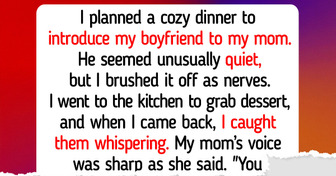I would like to say a few things here, basically I am in a situation where i cannot work because of my illnesses which have been diagnosed by doctors! I had to recently change from child benefit for my child to universal credit and they even told mer that with my illnesses I could not work! Yet my own children do not understand it and make me feel terrible as they continuously believe I could get a job (quote) "because you don't look that ill". It is extremely heart breaking for me as I used to work very hard when I was young picking up weights of 58kg plus every day and doing kickboxing after work so I was a hard worker and very fit. However a road traffic accident put paid to all that before my kids were even born!
so they have no idea their reaction to me not working is affecting my mentality. I have 2 chronic illnesses and osteoarthritis plus 12 other ailments on my account. I know I am unfit to work because of how these illnesses affect me daily! If you judge someone about whether they can work or not make sure you know all about that person first!
My Friend Claims I “Abandoned Her in Her Darkest Hour” — Her Next Move Caught Me Completely Off Guard
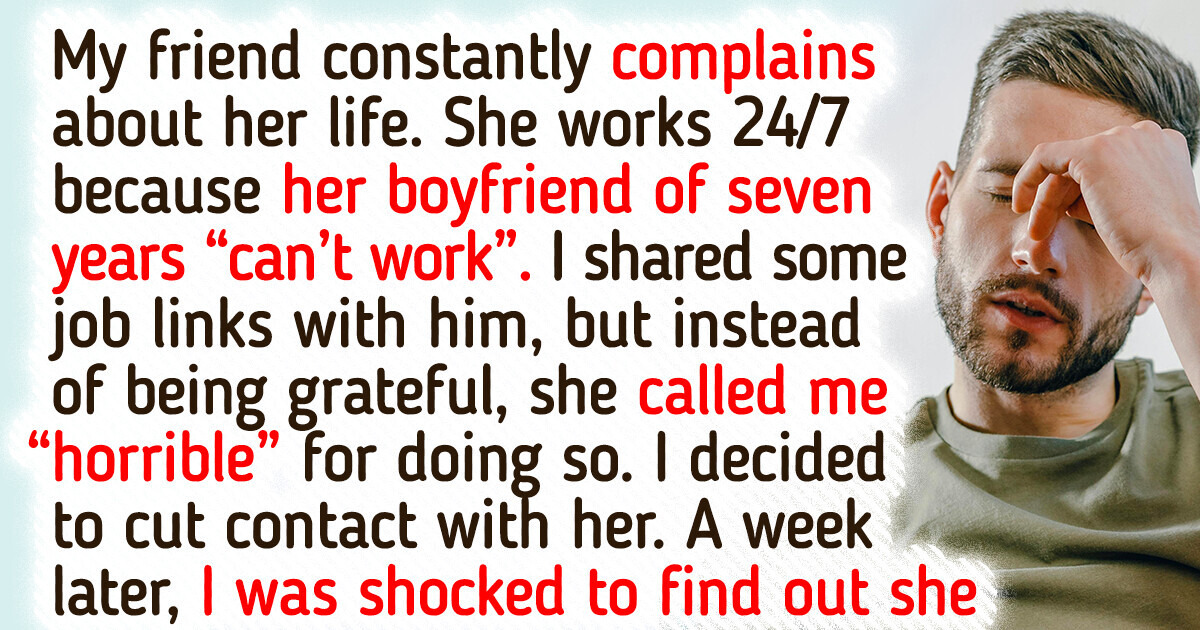
Friendships are meant to be built on mutual support and understanding. But what do you do when they begin to take an emotional toll? I never thought I’d face the heartbreaking decision to step away from my best friend of many years. Yet, I had to choose to protect my mental well-being and put self-care first. This is my story of that difficult journey.
A friendship that became toxic.
“Hi, Now I’ve Seen Everything readers! I’m Kyle, and I want to share something that’s been weighing on my mind. I’m not sure if what I did was right or wrong, but at the time, it felt like the right thing to do. Now, though, I’m second-guessing myself.
My friend Ellen constantly complains about her life. She works 24/7 just to make ends meet, all because her boyfriend of seven years struggles with anxiety and ’can’t work.’ While I genuinely empathized with her situation, it became draining to listen to her complaints without seeing any effort or progress toward change.”
Kyle continues, “Trying to help, I shared some job links tailored to someone dealing with anxiety, hoping her boyfriend could find something manageable and ease her burden. I thought it was a supportive gesture, but instead of being grateful, Ellen told our mutual friends I was ’trying to force her boyfriend to get a job’ and labeled me ’horrible’ for even suggesting it.
This wasn’t the first time my efforts to support her were met with hostility. Whenever I tried to share something about my own life or relationship, Ellen would completely derail the conversation, steering it back to her endless cycle of complaints and misery.”
The moment I hit my breaking point.
“The final straw came when I landed a new job, the one I’ve always dreamt of. I couldn’t wait to share the happy news with my best friend. But before I could even finish my sentence, Ellen cut me off with something that completely shocked me, ‘I can’t believe you’re talking about a dream job when I’m stuck in a dead-end job that I can’t quit.’
At that moment, I realized how one-sided our friendship had become. Her constant negativity and inability to support me in return were taking a toll on my emotional well-being. I decided to cut contact with her to protect my mental health.”
The betrayal I never saw coming.

“A week later, I was shocked to find out she had gone behind my back. Ellen had been spreading lies to our mutual friends, painting me as a villain who ‘abandoned her in her darkest hour.’ She twisted my actions, claiming that I was jealous of her relationship and wanted to meddle in their lives.
She even told people I was trying to make her boyfriend owe me a favor by forcing him to get a job. To make matters worse, she shared personal secrets I had confided in her, twisting them to make me look bad and complicating things between me and my girlfriend.
I trusted Rachel for years, and in the end, she betrayed me. That betrayal cut deeply, but it also gave me the clarity I needed to finally walk away. Maybe some friendships are just too toxic to save, no matter how much history they hold.
It wasn’t an easy decision, but I chose myself. I set boundaries and refused to let her manipulation and negativity control my life any longer. Walking away gave me the space to focus on my mental health and nurture relationships that truly bring me joy and support.
Now, she’s been apologizing and trying to reach out to me. Should I give her another chance? Or at least hear what she has to say?”
Thank you, Kyle, for sharing your story. One-sided friendships can indeed be emotionally exhausting, and prioritizing your mental peace is never something to feel guilty about. Here are some suggestions that might help you move forward:
- Evaluate her apology: Consider whether Ellen’s apology feels sincere. Does she genuinely take accountability for her actions, or does it come across as excuse-making? If it doesn’t seem genuine, you’re not obligated to respond or offer forgiveness.
- Take things at your pace: If you’re open to reconnecting, start small. Keep conversations light and observe whether she’s making real changes in her behavior. If reconnecting feels harmful or stressful, it’s okay to let go. You can acknowledge her apology without resuming the friendship.
- Decide on boundaries: If you choose to respond, be clear about what you’re comfortable with. Let her know what’s acceptable in your interactions moving forward.
- Communicate on your terms: Respond through text or email if you’re not ready for a phone call or face-to-face meeting. This lets you control the conversation and take time to process her words.
And here’s the story of a woman who was fed up with her friends always ordering expensive meals and expecting everyone to split the bill. After putting up with it for too long, she decided it was time to teach them a lesson.
Comments
Related Reads
I Banned My Ex-Husband’s New Wife from Seeing Our Kids for a Truly Good Reason
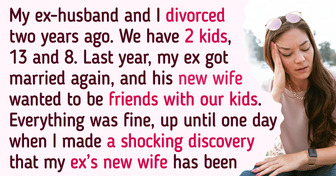
13 People Who Plunged Headlong Into Their Families’ Secrets and Now Deeply Regret What They’ve Found Out
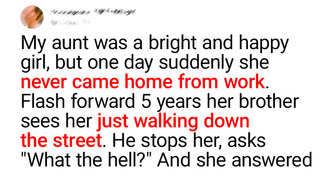
A Makeup Artist Transforms a Bride’s Face With Acne, and the Result Is Absolutely Astounding

10 Celebrity Children Blessed with Good Genes

A Baby Was Born with a Rare Skin Condition That Confused Doctors for 20 Years — Now He Looks Completely Unrecognizable

7 Stunning Haircuts Every Man Needs to Try This Season
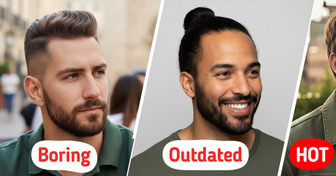
15 Stories That’ll Hit You Harder Than a Double Espresso
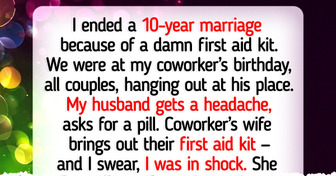
10 Quiet Family Secrets People Accidentally Discovered — And Never Forgot
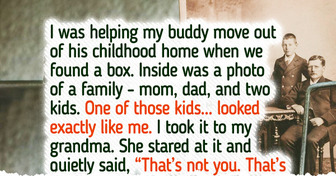
Prince Harry’s Secret Hollywood Love Story You’ve Never Heard Of

My MIL Shamed Me in a Restaurant — I Refuse to Be Her Doormat Anymore
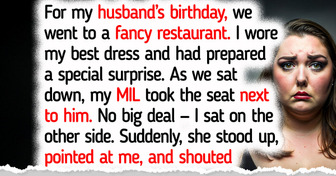
10 Amazing Pedro Pascal Facts That Prove He’s Absolutely Fascinating

13 Dinner Fiascos That Left Everyone Speechless
